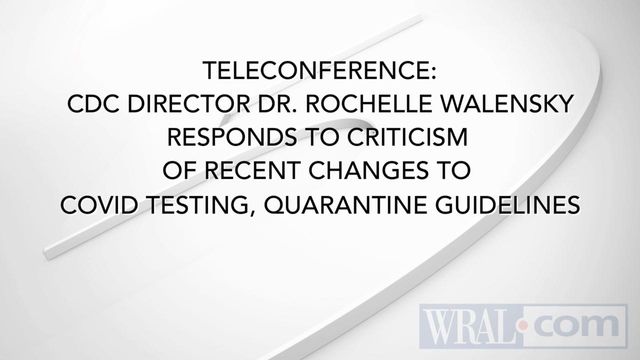Vaccinated NC students exposed to COVID no longer required to quarantine
Students who haven’t received a COVID-19 booster shot — but who have otherwise been vaccinated against the virus — won’t need to quarantine if they aren't feeling sick, according to the new advisory toolkit for schools.
The new toolkit also states schools that require masks can use a "test to stay" option for scenarios in which one person wasn't wearing a masks throughout the duration of their exposure, such as during lunch. That means, if the person exposed tests negative and isn't feeling sick, they can stay in school.
The North Carolina Department of Health and Human Services had already said people exposed to the virus could avoid quarantine if both they and the person who exposed them were wearing masks at the same time, even if the exposed person was unvaccinated. The change this week allows vaccinated students, masked or unmasked, to also avoid quarantine.
DHHS updated several parts of its section on handling COVID-19 exposure and cases, in an effort to mirror federal guidelines.
EARLIER:
Students who haven’t received a COVID-19 booster shot — but who have otherwise been vaccinated against the virus — won’t need to quarantine under certain conditions, according to the new advisory toolkit for schools.
The North Carolina State Board of Education approved updates Thursday to the StrongSchoolsNC Toolkit, at the request of the North Carolina Department of Health and Human Services. Typically, DHHS makes updates on its own and, days later, the state board updates its guidance for schools to mirror the DHHS toolkit.
It wasn’t clear Thursday why DHHS asked the board to approve the changes. Betsey Tilson, the state health director and chief medical officer, told the board via videoconferencing that DHHS wanted to run the changes by the board before sending out a new toolkit to schools.
DHHS will publish its new document Friday, and that could include other guidance.
“We will be providing more details regarding updates to the StrongSchools toolkit, including details of any test to stay recommendations for mask required schools, tomorrow,” a DHHS spokeswoman told WRAL News.
The StrongSchoolsNC Toolkit will now state:
- People who are eligible for a COVID-19 booster shot but haven’t received one don’t need to quarantine from school when exposed to the virus, if they are not feeling ill.
- People infected with COVID-19 need to isolate for only five full days and wear a mask for five full days after that.
The number of daily new COVID-19 cases and the percent of tests coming back positive remain at record highs as the more infectious omicron variant spreads in North Carolina and beyond. Data from Jan. 5 show 20,770 new cases and 31.8% of tests coming back positive.
At first glance, the variant appears to not cause as severe of cases as other forms of the virus have, Tilson said. At the same time, hospitalization rates remain high, as beds are filled largely with people not vaccinated against this virus.
DHHS revised the toolkit last week in the wake of U.S. Centers for Disease Control and Prevention guidance that shortened quarantine recommendations for people exposed to the virus.
Since, the CDC has also recommended shortened isolation.
Coronavirus vaccinations in NC
The revision last week of the toolkit reflected the quarantine guidance and said people up-to-date with recommended vaccinations, including the COVID-19 vaccine, did not need to quarantine. At the time, eligibility for but failure to get a COVID-19 booster shot would have forced someone to quarantine.
Children as young as 12, as of Thursday, are now eligible for a COVID-19 booster shot.
The vaccine, Tilson said, remains more effective at stopping the spread of COVID-19 than forgoing the vaccine. It remains much more effective at reducing serious illness.
Board Member Amy White questioned DHHS’ decision to include only people in mask-required settings in the new quarantine guidance, when some research shows regular cloth masks are less effective at preventing spread of the more infectious omicron variant of the virus.
Medical grade masks, such as N-95 masks, and surgical masks are more effective at preventing COVID-19 spread but are not made to fit children’s faces.
Tilson said the “total body of evidence” continues to support mask wearing.
Tilson noted data from Oct. 10 through Dec. 7 — though before the omicron variant’s first detected appearance in North Carolina Dec. 10 — showed COVID-19 clusters in 21 of 46 school districts that had mask optional policies, compared to in six of 65 districts that had mask requirements.
A pilot “test to stay” program in five school districts and one charter that require masks shows, through Dec. 13, higher transmission rates of COVID-19 at lunch break and during athletics, when students aren’t wearing masks, Tilson said.
That pilot is run by the ABC Science Collaborative. “Test to stay” refers to having students exposed to the virus test negative for the virus to remain in school, without quarantine.











